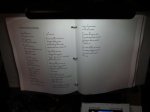I'm trying to find lighting for my isolation booth where I record voice over. My mic (an AKG c414 XLII) is picking up every light I've tried.
I've tried LED rope lights, LED tape lights, and LED puck lights. My mic picks them all up as a deep hum. I've made sure that the cord is nowhere near my mic cable, and I've tried different outlets. The hum disappears when the lights are gone... but unfortunately I can't read in the dark.
I heard that LED lights were best, because they don't give off much heat and booths can get hot. But would incandescents be quieter? Or some other type of LED, maybe a specialty LED light? I bought the ones I've tried at Home Depot.
Thank you for your help.
I've tried LED rope lights, LED tape lights, and LED puck lights. My mic picks them all up as a deep hum. I've made sure that the cord is nowhere near my mic cable, and I've tried different outlets. The hum disappears when the lights are gone... but unfortunately I can't read in the dark.
I heard that LED lights were best, because they don't give off much heat and booths can get hot. But would incandescents be quieter? Or some other type of LED, maybe a specialty LED light? I bought the ones I've tried at Home Depot.
Thank you for your help.



 . I introduce to you.......
. I introduce to you.......
